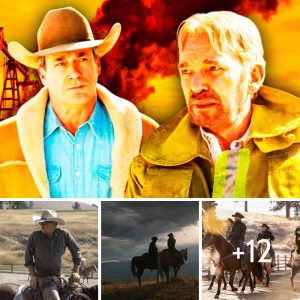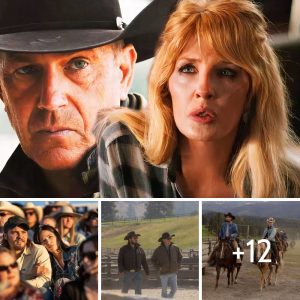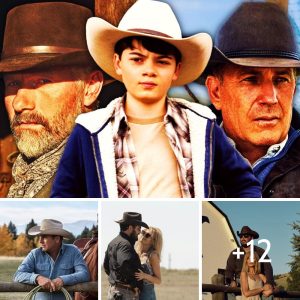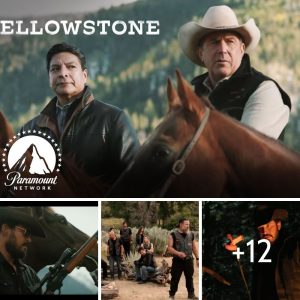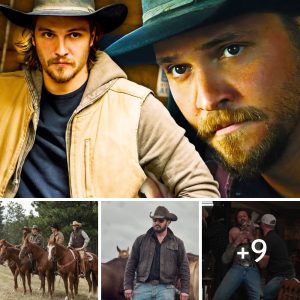In the untamed, majestic expanse of Montana, where the rugged beauty of nature collides with the unyielding will of man, the Dutton Ranch stands as a fortress, a symbol of heritage and an unwavering defiance against all who threaten its sovereignty. Paramount Network’s hit drama, Yellowstone, consistently plunges audiences into the heart of this volatile world, and a recent, electrifying confrontation between the stoic ranch hands and a band of arrogant bikers served as a visceral reminder of the Duttons’ uncompromising defense of their land. It was a clash of cultures, a brutal ballet of dominance, and a stark declaration: trespassers on the Yellowstone Ranch do not merely cross a property line; they invite the full, unforgiving wrath of its guardians.
The scene unfolds under the vast, indifferent Montana sky, a landscape of breathtaking beauty that often belies the simmering tensions beneath. A group of heavily leathered, loud-mouthed bikers, embodying the very essence of urban disregard, has dared to set up camp, their roaring engines and boisterous attitudes shattering the serene silence that defines the Duttons’ domain. Their misguided belief that they occupy “national park” land instantly sets the stage for conflict, highlighting a fundamental ignorance of the hallowed ground they’ve violated.
Enter the Yellowstone ranch hands, a formidable crew led by the ever-stoic and strategically sharp Kayce Dutton. Clad in their work-worn denim and Stetsons, they represent the very soul of the ranch—men forged in the crucible of hard labor and unwavering loyalty, their presence a silent, yet potent, warning. As Kayce approaches, his demeanor is one of measured calm, a deceptive tranquility that belies the fire simmering beneath. He attempts to de-escalate, his words direct and unambiguous: “Listen, you can’t be here. It’s private property.” The bikers, however, are steeped in their own misguided bravado, scoffing at the notion, clinging to their erroneous belief about public land.
The dialogue quickly devolves, a masterclass in escalating tension. “This is national park,” one biker asserts, his voice dripping with condescension. Kayce, ever patient, clarifies: “That’s national park, this is the Dutton Ranch.” The subtle distinction, lost on the bikers, is everything to the Duttons. When the biker, attempting a pathetic jest, points to a map and declares, “Science says Yellowstone got a big [expletive] Y on it,” Kayce’s response is a chillingly quiet affirmation of identity: “The Y is for the Yellowstone ranch. You said Dutton Ranch? It’s the Yellowstone ranch.” The emphasis on “the Yellowstone ranch” isn’t just about clarifying a name; it’s a declaration of ownership, a defiant stake in the ground.
The situation tightens when Kayce, asserting his authority as a livestock agent, warns them of a trespass citation. The bikers scoff, dismissing his badge as mere “cow police.” It’s a casual insult that cuts deep, a blatant disrespect for the badge, the man, and the very concept of law and order the Duttons embody on their own terms. Then, a pink-haired female biker, oozing with misplaced confidence, steps forward, her gaze challenging, her tone laced with venom. A ranch hand, likely Ryan, meets her gaze with an unwavering stare. “Look at this pink-haired heck mad-dogging me,” a male biker comments, stirring the pot. “You got a problem, [expletive]?” she snarls at the ranch hand. The line is crossed, the final thread of civility severed. “What the [expletive] you just say to me?” the ranch hand retorts, the slow burn of rage finally igniting. Her defiant yell, “I called you a [expletive]!” is the match that sets the powder keg alight.
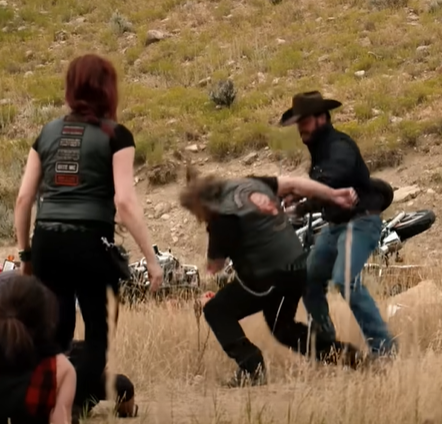
In an instant, the peaceful tableau shatters. The tranquil setting explodes into a cacophony of primal fury – a flurry of fists, grunts, and the sickening thud of bodies colliding. The Yellowstone ranch hands, a well-oiled machine of loyalty and honed aggression, move with swift, brutal efficiency. This isn’t a fair fight, nor is it meant to be. It’s a calculated, overwhelming response to perceived disrespect. While the bikers flail with uncoordinated aggression, the ranch hands operate with the unified precision of men accustomed to hard-hitting realities. Each punch landed, each body slammed, is a testament to their unwavering solidarity and the profound, almost spiritual, connection they share with the land and with each other.
Amidst the chaos, Kayce Dutton remains a singular force of nature. His eyes, cold and assessing, scan the melee not for individual targets, but for the strategic lynchpin. He identifies the bikers’ leader, “the big guy with the beard,” as the one who controls the group’s narrative and, more importantly, their retreat. With a laser-like focus, Kayce cuts through the fray, his movements decisive and powerful. He wastes no time in engaging the leader directly, his grip like iron, pulling the stunned biker to his feet amidst the unfolding pandemonium.
The climactic moment arrives as Kayce, holding the bewildered and clearly outmatched biker leader by the scruff, delivers his chilling ultimatum. His voice, though not a shout, carries the weight of the Montana mountains, each word a hammer blow of cold, hard truth: “I’m gonna give you one last chance. You leave now or you’ll never leave. I’ll bury you [expletive] stand. Get the [expletive] outta here!” It’s a threat delivered with such unwavering conviction that it leaves no room for doubt. This isn’t bravado; it’s a promise, backed by the raw, brutal power of the Dutton ranch. The leader, his arrogance shattered, his face etched with fear, understands the gravity of the situation. His broken spirit signals the end of the confrontation. The remaining bikers, their defiance extinguished, scramble back to their motorcycles, their grand entrance culminating in a humiliating, swift retreat.
The brawl, though brief, carries profound implications for the narrative of Yellowstone. It reinforces the core tenets of the Dutton universe: that the ranch is not merely property but a sacred trust, defended with uncompromising force. It showcases Kayce Dutton’s evolution into a formidable protector, blending his official authority as a livestock agent with the primal, territorial instinct of a Dutton. His ability to control the chaos, identify the weakness, and deliver a definitive, terrifying warning solidifies his role as an indispensable enforcer of the ranch’s will.
Moreover, the incident serves as a stark warning to any who might underestimate the Duttons or their ranch hands. They are not merely cowboys; they are guardians, fierce and unyielding. This confrontation is a microcosm of the larger war the Duttons wage against encroaching modernity, corporate greed, and any individual or group that dares to challenge their dominion. Every victory, no matter how small, adds to the legend and solidifies the Duttons’ place as the undisputed rulers of their corner of Montana.
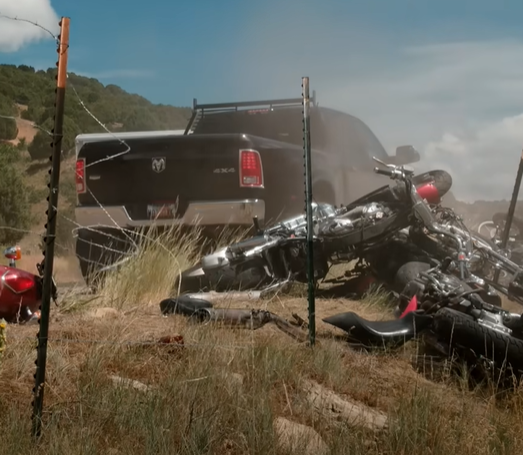
As the dust settles and the roar of retreating engines fades, a tense calm descends upon the Yellowstone Ranch. The silence that follows the storm is not one of peace, but of a quiet, potent power. It’s a testament to the fact that on the Dutton land, respect is earned, and disrespect is met with immediate, unforgettable consequences. This scene is more than just a fight; it’s a declaration. A declaration that the Yellowstone, with its untamed spirit and its unyielding guardians, will always stand, ready to bury anyone who dares to challenge its reign. And for fans of Yellowstone, it’s just another thrilling chapter in the ongoing saga of America’s most compelling, and most dangerous, ranching family.
